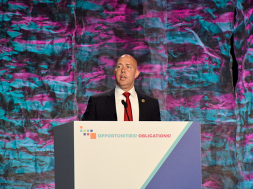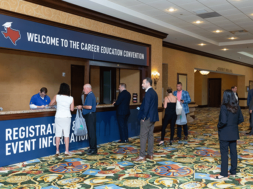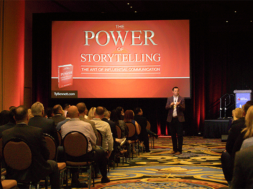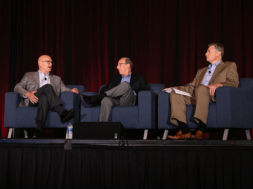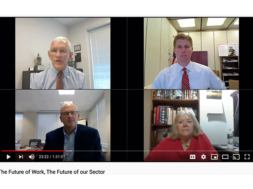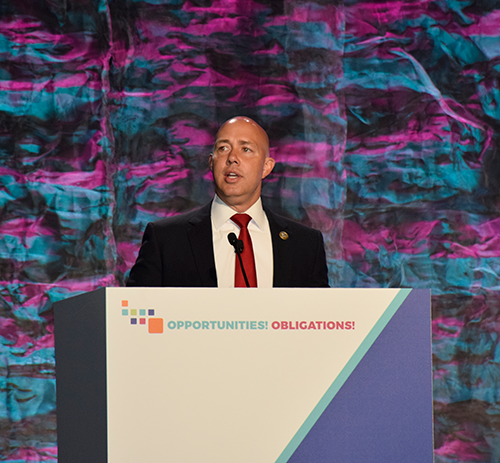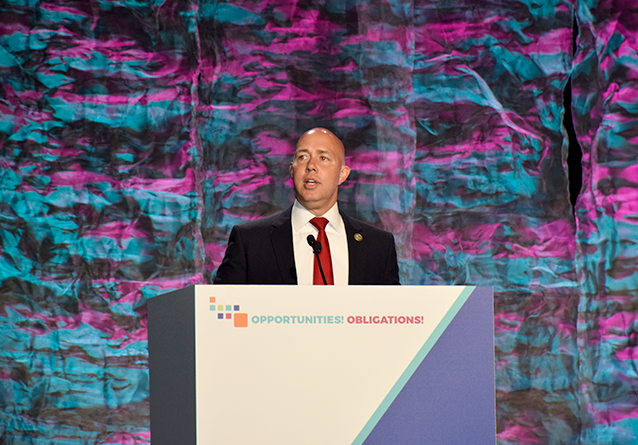
Mast: ‘Defining Moments’ Help People Find Purpose and Success in Life
Written from CECU Plenary Presentation, “A Commitment to Service” with U.S. Representative Brian Mast (FL-18)
Everyone has a defining moment in his or her life. U.S. Representative Brian Mast (FL-18) knows that better than most.
For Mast, speaker at the 2018 Career Education Colleges and Universities (CECU) Annual Convention and Expo in June, one of his defining moments came in 2010 when he served as a bomb technician for the U.S. Army.
“I was deployed to Afghanistan as a part of the U.S. Army’s Joint Special Operations Command supporting the 75th Ranger Regiment there,” Mast said. “We were going after very high value targets. It was always under the coverage of darkness. We never turned on the lights for anything.”
On Sept. 19, Mast and his unit were dropped off in a field in the south of Afghanistan, somewhere near Kandahar. But the field was on the wrong side of the river, and their target was on the other side.
“As the bomb technician, I was … clearing the way across that area of the battlefield to lead my assault force to where our targeted compound was,” Mast said. His job was to guide his unit away from improvised explosive devices, or IEDs, as well as land mines or bombs.
“I was looking for a place to get across that river,” he recalled. “It was difficult to go through those waterways that were deep and filled with sewage.”
Eventually, he found a place that would allow the group to forge across the waterway. Conveniently, there was also a break in the high wall on the other side of the waterway. He knew that the site was almost certain to have some type of booby trap.
He went through the usual methods to locate bombs or IEDs. “On the near side of the river, I got down on my hands and knees and I started to look for batteries and wires and disturbed earth and different things that I might see in the ground,” he said. “I didn’t find or see anything.”
So he started to move ahead, giving a signal to the two snipers he was working with. “I took maybe one or two, or maybe even three steps, past that area that I had just cleared and I found that device that I knew was there. I didn’t find it in the way that I had wanted to. In all likelihood, I stepped on the device.”
Mast guessed it was some kind of pressure plate buried in the ground that was attached to about 10 pounds of explosives.
“It detonated beneath my feet,” he said. “I remember the explosion going off. I remember it tumbling me through the air. I can remember this huge plume of dust and dirt… I was engulfed in that plume and I couldn’t see anything.”
He wiped the soot out of his eyes, and then looked at his left arm. “All of my fingers were broken on my left hand. One of them was barely hanging on. There was extensive damage to my forearm. I don’t want to be too graphic, but it was a mess.”
With his radio piece still in his ear, he could hear his men call out that he was down and start to approach him so they could provide aid. But getting to him wasn’t going to be easy since IEDs on the battlefield don’t necessarily just come in ones, twos, threes or fours.
“But they made their way to me … and they started to render aid to me, which is probably the most painful thing that I could ever remember in my life,” Mast said. “But they did their job well and saved my life.”
Mast said finding his purpose after losing both legs was key and helped him become who he is today. “I was able to go out there and redefine myself,” he said. “The reality of this situation … was that I was never going to return to the battlefield in the same way that I had known it before. My purpose in life was just lost.”
Mast said he was able to redefine his life, much in the same way career schools do for their students. “I honestly believe that this is the work that you all do on a daily basis, which is to go out there and help that person … to have that ability to redefine their life,” he said.
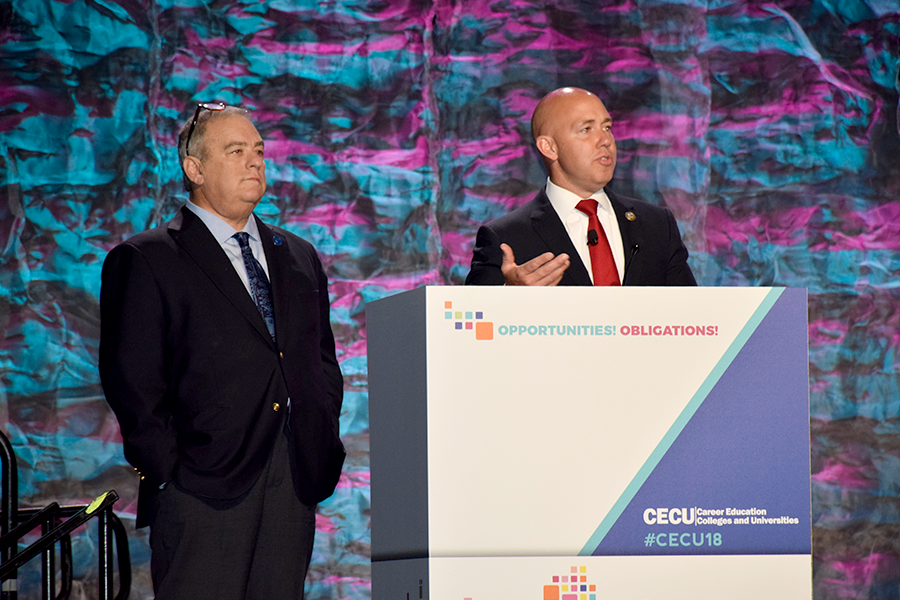
He said many proprietary schools help those coming out of the military, including those with and without injuries or injuries that people may never see. “That is a role that I appreciate each and every one of you playing because it absolutely matters,” Mast said.
After being injured, Mast said he woke up in the Walter Reed Army Medical Center in Washington D.C. and one of the first things his father told him, after saying he loved him and that he was glad he was OK, was to not let the accident keep him down.
“You’ve got to find a way to pull yourself up, to get yourself out there and to get back to work,” he said. His father also said he shouldn’t let his children see him just sitting around, or they would think that it’s OK for them to do the same thing.
Mast said everyone needs to find an opportunity to occasionally redefine his or her life. “We have to find an ability to find that purpose,” he said. “There are so many people out there like me who may not have come to higher education in the traditional way. I came to higher education after those injuries. I became a hundred times better student after my military career and I graduated with honors.”
Had he gone on to higher education right after high school, Mast said he probably would have been unsuccessful. “For me, it would’ve looked a lot like high school,” he said. “I would’ve spent a lot of time drinking beer, playing sports and chasing girls. I would’ve been completely unsuccessful at that time.”
But because Mast pursued his education at the right time in his life, it ended up being a great success story for him, he said. “The individuals that come to see you all are seeking to improve,” he said. “They’re seeking to grow as individuals. Our country needs to continue to work to foster an educational environment that supports these individuals. I’ve been knocked on my back before, and I’m stronger because I didn’t just lie there. I found a way to get back up. Education was absolutely part of that way for me to get back up. These are the kinds of people that we have the opportunity to serve by helping to empower them to the next stage in life.”
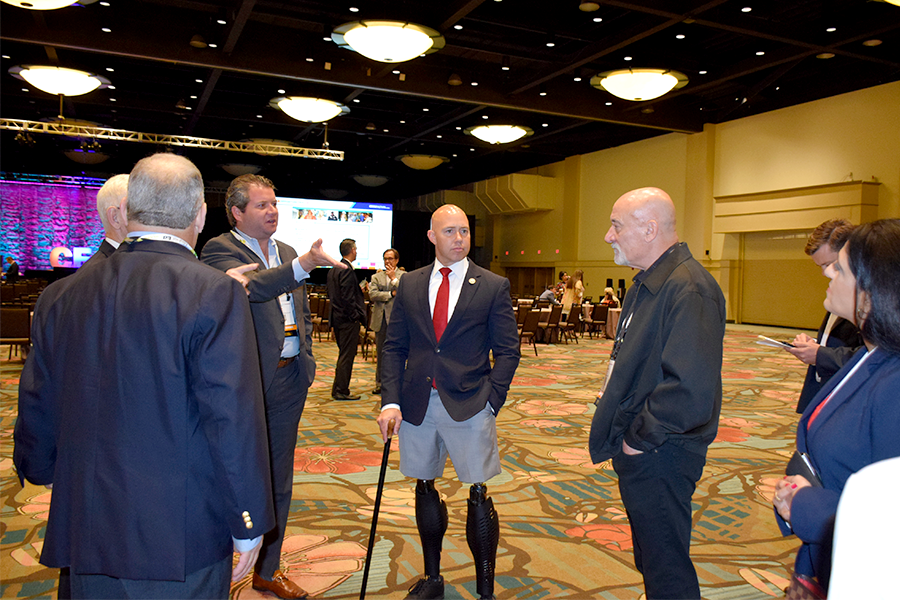
Responding to audience questions, Mast said there is a lot of bipartisan support in Washington, D.C., despite what people see in the news. “On any given day, there’s 100 other things that happened that are completely bipartisan,” he said. “In fact, if you looked at the amount of bipartisan work that goes on in Congress, most people would be surprised to know that it’s probably somewhere around 87 percent right now.”
However, while U.S. representatives can agree about something they don’t like, it’s very difficult to get all 435 to agree on how to fix it. “That’s why the process often becomes so incredibly polarizing,” he said.
While the proprietary education sector has an image problem, there are things that can be done to improve that image, Mast said. For one, consumer advocacy groups need to focus on more than just a salary that students will earn upon graduation, he said. They also need to address where the responsibility lies with potential students to do their due diligence when deciding upon what career path to follow, he said.
Mast recommended career colleges work with the consumer advocacy groups, and advocate for the consumer to be responsible as an individual, as well and do his or her research.
U.S. REPRESENTATIVE BRIAN MAST (R-Fla.) is in his first term representing the 18th Congressional District of Florida. Previously, Mast served in the U.S. Army for more than 12 years, earning the Bronze Star Medal, the Army Commendation Medal for Valor, the Purple Heart Medal and the Defense Meritorious Service Medal.
After being injured in Afghanistan, he remained on active duty during his recovery and provided expertise to the National Nuclear Security Administration and the Bureau of Alcohol, Tobacco & Firearms. After retiring from the Army, he continued working in counter-terrorism and national defense as an explosive specialist with the Department of Homeland Security.
Mast subsequently received a degree from the Harvard Extension School. He is a member of three committees in Congress: the Transportation and Infrastructure Committee, the Foreign Affairs Committee and the Veterans Affairs Committee.
Contact Information: U.S. Rep. Brian Mast // 2182 Rayburn House Office Building, Washington, DC 20515 // 202-225-3026 // 202-225-8398 // https://mast.house.gov/email
